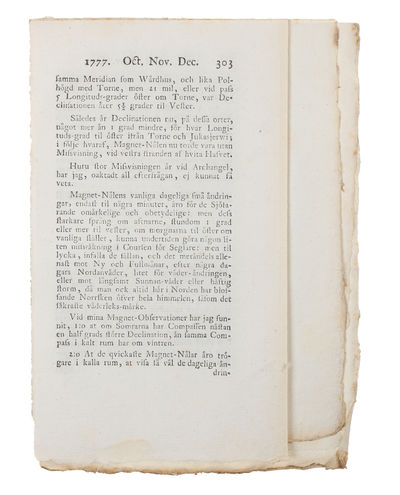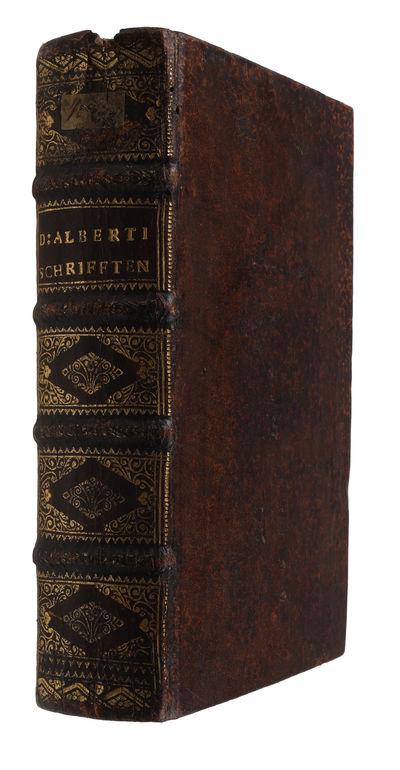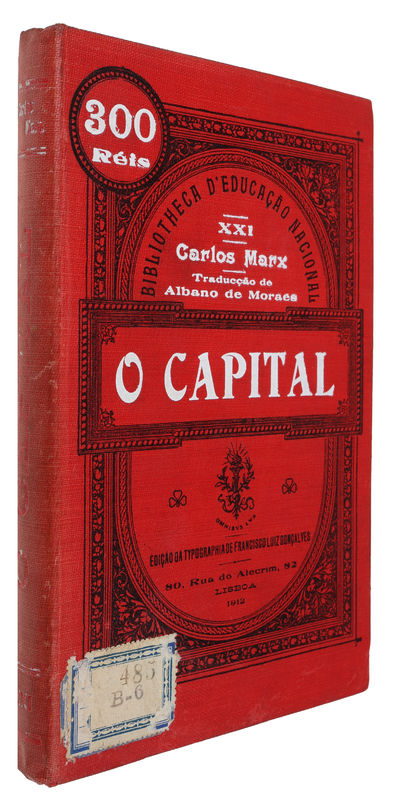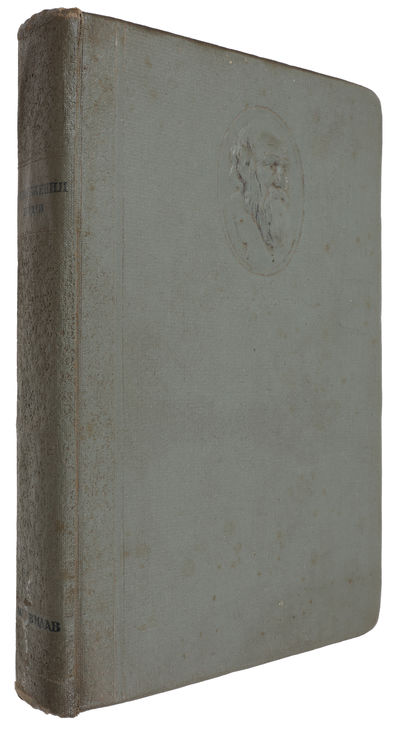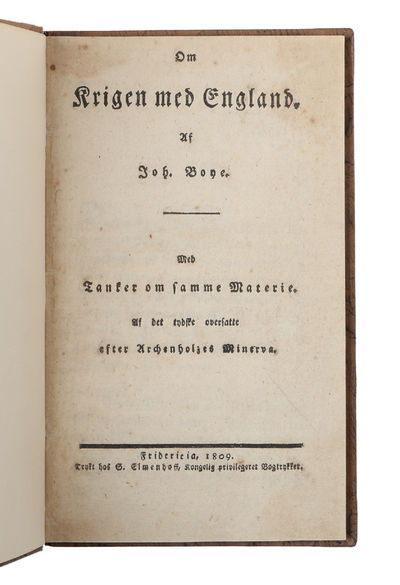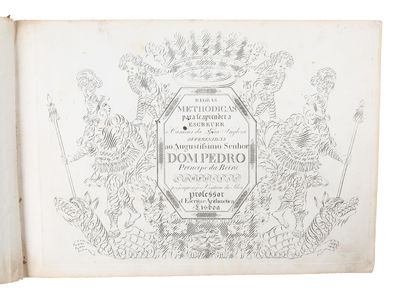DARWIN, CHARLES.
Proiskhozhdenie chelovieska i polovoi podbor [i.e. English "Descent of Man"]. - [FIRST TRANSLATION OF DARWIN'S 'DESCENT OF MAN' INTO ANY LANGUAGE]
Herman H. J. Lynge & Søn A/S
lyn56375
S.-Peterburg, Izdanie redaktsii zhurnala "Znanie, 1871. 8vo. In recent half calf with four rasied bands and gilt lettering to spine. Soiling and damp stain to title-page. Light brownspotting throughout. (2), VII, (5), 439, (7) pp.
The exceedingly rare first Russian translation of Darwin's 'Descent of Man' published only four months after the original English. The Russian publisher was eager to have a translation published, hence this early abridged edition - two other Russian translations followed later the same year - The present translation being the very first into any language. "The Descent of Man showed that the process of organic evolution, propelled by the struggle for existence and natural selection, applied to man no less than to the rest of the animal kingdom. It gave explicit recognition to the idea of the anthropoid origin of man. This claim surprised no one, for it was clearly hinted at in the great work of 1859 and was elaborated in Thomas Huxley's Man's Place in Nature and Vogt's Lectures on Man. Nor was it much of a surprise when three Russian translations of The Descent appeared within one year after the publication of the English original. Two general ideas represented the essence of The Descent: natural selection is not only behind the physical survival of man but also behind the evolution of cultural values; and the differences between animal and human behavior are differences of degree rather than of kind." (Darwin in Russian Thought) "The Expression helped lay the foundations for a scientific study of the psychological aspect of the evolution of species. The book appeared in a Russian translation only a few months after the publication of the English original. The paleontologist Vladimir Kovalevskii was the translator, and the embryologist Aleksandr Kovalevskii was in charge of editorial tasks. In 1874 Vladimir wrote to Darwin that nearly two thousand copies of the Russian translation were sold." " The Expression deals much more extensively with selected aspects of human and animal behavior than with general problems of evolutionary biology. The Russian reviewers were generally impressed with Darwin's descriptions and categorizations of animal behavior. The Journal of the Ministry of Public Education was unusually profuse in praising the book's content and writing style. The reviewer commended Darwin's impartiality and avoidance of "materialistic trappings." Even the adherents of spiritualism could read the book, he wrote, without the least discomfort. The reviewer thought that psychologists would benefit from the information the book presented on the "physiological" basis of behavior. Indeed, he recommended the book to all readers interested in the scientific foundations of human behavior. The liberal journal Knowledgewas equally laudatory. It noted that the book was eminently successful on two counts: it offered a "rational explanation" of many expressions of human emotions, and it integrated the study of animal and human behavior into the universal process of organic evolution. In fact, no educated person could afford to ignore it.N. P. Vagner, professor of zoology and comparative anatomy at St. Petersburg University, called The Expression a book with "great strengths and minor flaws." The volume reminded him of Darwin's previous works, which marked "turning points in the history of science." The strength of the book lay much more in its suggestion of new topics for comparative-psychological research than in a presentation of a theoretically and logically integrated system of scientific thought. Insufficient exploration of the physiological underpinnings of mental activities represented the book's major shortcoming" (Darwin in Russian Thought) In Russia Darwinism had a profound influence not only upon the different sciences, but also on philosophy, economic and political thought, and the great literature of the period. For instance, both Tolstoy and Dostoevsky referenced Darwin in their most important works, as did numerous other thinkers of the period.Like Strakhov, however, Dostoevsky, acknowledging the significance of the "Origin of Species", saw the dangers of the theory. In the same year as the publication of Rachinsky's translation, he lets the narrator in "Notes from Underground" (1864) launch his attack on Darwinism , beginning: "As soon as they prove you, for instance, that you are descended from a monkey, then it's no use scowling, you just have to accept it."In "Crime and Punishment" (two years later, 1866) the Darwinian overtones inherent in Raskolnikov's theory of the extraordinary man are unmistakable. He describes the mechanism of "natural selection," where, according to the laws of nature, by the crossing of races and types, a "genius" would eventually emerge. In general, Darwinian themes and Darwin's name occur in many contexts in a large number of Dostoevsky's works.'Descent of Man' was transted into Danish, Dutch, French, German, Italian, Polish, Russian and Swedish in Darwin's lifetime. Freeman 1107.
The exceedingly rare first Russian translation of Darwin's 'Descent of Man' published only four months after the original English. The Russian publisher was eager to have a translation published, hence this early abridged edition - two other Russian translations followed later the same year - The present translation being the very first into any language. "The Descent of Man showed that the process of organic evolution, propelled by the struggle for existence and natural selection, applied to man no less than to the rest of the animal kingdom. It gave explicit recognition to the idea of the anthropoid origin of man. This claim surprised no one, for it was clearly hinted at in the great work of 1859 and was elaborated in Thomas Huxley's Man's Place in Nature and Vogt's Lectures on Man. Nor was it much of a surprise when three Russian translations of The Descent appeared within one year after the publication of the English original. Two general ideas represented the essence of The Descent: natural selection is not only behind the physical survival of man but also behind the evolution of cultural values; and the differences between animal and human behavior are differences of degree rather than of kind." (Darwin in Russian Thought) "The Expression helped lay the foundations for a scientific study of the psychological aspect of the evolution of species. The book appeared in a Russian translation only a few months after the publication of the English original. The paleontologist Vladimir Kovalevskii was the translator, and the embryologist Aleksandr Kovalevskii was in charge of editorial tasks. In 1874 Vladimir wrote to Darwin that nearly two thousand copies of the Russian translation were sold." " The Expression deals much more extensively with selected aspects of human and animal behavior than with general problems of evolutionary biology. The Russian reviewers were generally impressed with Darwin's descriptions and categorizations of animal behavior. The Journal of the Ministry of Public Education was unusually profuse in praising the book's content and writing style. The reviewer commended Darwin's impartiality and avoidance of "materialistic trappings." Even the adherents of spiritualism could read the book, he wrote, without the least discomfort. The reviewer thought that psychologists would benefit from the information the book presented on the "physiological" basis of behavior. Indeed, he recommended the book to all readers interested in the scientific foundations of human behavior. The liberal journal Knowledgewas equally laudatory. It noted that the book was eminently successful on two counts: it offered a "rational explanation" of many expressions of human emotions, and it integrated the study of animal and human behavior into the universal process of organic evolution. In fact, no educated person could afford to ignore it.N. P. Vagner, professor of zoology and comparative anatomy at St. Petersburg University, called The Expression a book with "great strengths and minor flaws." The volume reminded him of Darwin's previous works, which marked "turning points in the history of science." The strength of the book lay much more in its suggestion of new topics for comparative-psychological research than in a presentation of a theoretically and logically integrated system of scientific thought. Insufficient exploration of the physiological underpinnings of mental activities represented the book's major shortcoming" (Darwin in Russian Thought) In Russia Darwinism had a profound influence not only upon the different sciences, but also on philosophy, economic and political thought, and the great literature of the period. For instance, both Tolstoy and Dostoevsky referenced Darwin in their most important works, as did numerous other thinkers of the period.Like Strakhov, however, Dostoevsky, acknowledging the significance of the "Origin of Species", saw the dangers of the theory. In the same year as the publication of Rachinsky's translation, he lets the narrator in "Notes from Underground" (1864) launch his attack on Darwinism , beginning: "As soon as they prove you, for instance, that you are descended from a monkey, then it's no use scowling, you just have to accept it."In "Crime and Punishment" (two years later, 1866) the Darwinian overtones inherent in Raskolnikov's theory of the extraordinary man are unmistakable. He describes the mechanism of "natural selection," where, according to the laws of nature, by the crossing of races and types, a "genius" would eventually emerge. In general, Darwinian themes and Darwin's name occur in many contexts in a large number of Dostoevsky's works.'Descent of Man' was transted into Danish, Dutch, French, German, Italian, Polish, Russian and Swedish in Darwin's lifetime. Freeman 1107.
Address:
Silkegade 11
DK-1113 Copenhagen Denmark
Phone:
CVR/VAT:
DK 16 89 50 16
Email:
Web:
![Proiskhozhdenie chelovieska i polovoi podbor [i.e. English "Descent of Man"]. - [FIRST TRANSLATION OF DARWIN'S 'DESCENT OF MAN' INTO ANY LANGUAGE] (photo 1)](https://d3525k1ryd2155.cloudfront.net/h/190/805/1243805190.0.l.0.jpg)
![Proiskhozhdenie chelovieska i polovoi podbor [i.e. English "Descent of Man"]. - [FIRST TRANSLATION OF DARWIN'S 'DESCENT OF MAN' INTO ANY LANGUAGE] (photo 2)](https://d3525k1ryd2155.cloudfront.net/h/190/805/1243805190.1.l.0.jpg)
![Proiskhozhdenie chelovieska i polovoi podbor [i.e. English "Descent of Man"]. - [FIRST TRANSLATION OF DARWIN'S 'DESCENT OF MAN' INTO ANY LANGUAGE] (photo 3)](https://d3525k1ryd2155.cloudfront.net/h/190/805/1243805190.2.l.0.jpg)
